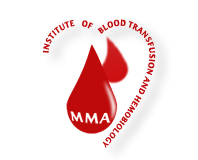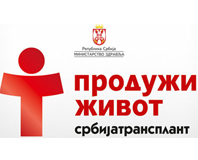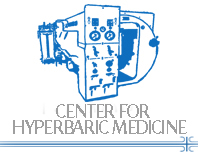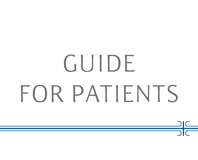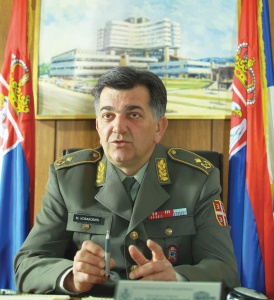
Interview with the Head of the MMA, Brig. Gen. Prof. Dr. Marijan Novaković for the „Military Medical Review“Magazine
02. 03. 2012
THE YEAR OF EQUIPPING
The employees of the Military Medical Academy are marking the 168 years of the existence and operation of that on the 2nd of March. This year could be called the year of equipping for the provision of modern equipment has brought about significant improvements in the treatment of patients.
Brigadier General Prof. Dr. Marijan Novaković, a well-known plastic surgeon, who has performed the most complex surgical procedures in almost all areas of plastic, reconstructive and cosmetic surgery, assumed the position of the head of the Military Medical Academy a year ago. He was portrayed as a man of continuity, a person who would lead this institution forward with his knowledge, persistance and strong organization. We talked with him little before the 2nd of March, the MMA’s Day.
· Dear General, how would you assess the previous year? Has any progress been seen in the MMA’s work?
I think that some steps forward in the treatment, science and education have been seen over that period at the MMA. More precisely, quantitative steps forward were made in terms of the number of treated and cured patients, as well as qualitative advances achieved through the application of new diagnostic procedures, particularly in the field of radiology and some segments of the laboratory work. In the therapeutic sense as well, there are some significant novelties regarding the introduction of the latest protocols in the treatment of malignant diseases in any of its segments. The Ministry of Defence consent given to us to operate as a referral oncology center, considerably contributed to the improvement and facilitation of our work. It means that we would be able not only to diagnose a malignant disease but to treat it using cytostatic and other adequate therapies.
By opening the angiography unit and the procurement of a new linear accelerator, the waiting time for the treatment of both military and civilian insured patients has significantly been reduced. Furthermore, the purchase of a new neurosurgical microscope enabled more precise performance of surgeries involving benign and malignant processes in the brain. That would certainly bring about the improvement of our surgical technique and an increase in the percentage of cured of patients.
International cooperation has also been intensified. There was almost no period during the whole last year, when we were not hosting one of the visits to the MMA paid by international military and civilian medical delegations. This year, we plan to visit several military hospitals in the U.S. within the framework of our Ministry of Defence official visit plan, and prepare the ground for establishing military medical partnership in the future.
The enrollment of a new generation of military medical cadets is currently under way, and since recently, we have another class of doctors serving the voluntary military service. That class is, this time, comprised of members of the fairer sex, what is in line with the UN Resolution 1325. Once they complete their military training, the strength of physicians within the Defense System will be significantly increased. That is the way to overcome the shifts of physicians serving in the troops, and ensure that our colleagues enter their residencies as soon as possible.
· Recently, at the ceremony launching a new linear accelerator, the Minister of Defense said that it was only the beginning, and that they would continue with equipping and modernizing military hospitals in Serbia. What else does the MMA need to buy and renew to make its work more successful?
Our plans for this year anticipate the procurement of new ultrasound apparatuses, particularly in gynecology, where they can be used for proper purposes. Some devices of the latest generation for cardiological and nephrological purposes are also planned to be provided to meet the needs of the Centre for Solid Organ Transplantation. The provision of those devices will significantly contribute to the betterment of diagnosis in those branches of medicine. Modernization of labs by buying new lab equipment and reagents is a part of our plans too.
Since the surgery is our brand, we must work on the advancement of that segment as well. We expect the acquisition of new operating tables and lamps to be finalized in the course of this year, since the existing ones being more than 30 years in use are quite obsolete.
All these technological innovations will be followed by regeneration and professional development of medical personnel in both the country and world centers. We intent to send our female colleague dealing with the internal aspect of solid organ transplantation –that is the liver transplants, to one of the largest centers in the U.S., which specializes in this pathology.
• Having in mind the economic situation and the cuts in the military budget, is it realistic to expect the procurement of that equipment and devices to take place?
We try to make it realistic, and to start with purchasing disposable medical supplies, medications and other material. I think that we have the support, especially financial, of other users of our services. I would like to emphasize, in particular, that the Republic Health Insurance Fund adheres to every aspect of our contract relating to the provision of services to civilian insured patient population. There are also patients from Montenegro, the Republic of Srpska with whom we have signed contracts, and from other countries in our surrounding too.
· Has Wednesday – the day when you operate round–the-clock as the Emergency Center serving the entire population of the country- become a routine?
We receive civilian referrals on other days, but that day, we are on duty for the whole of Serbia, meaning that all acute conditions and injuries are dealt with at the MMA. Our teams are well coordinated, and capable of responding to a great number of emergencies what includes examinations, therapeutical and surgical treatment. Of course, we operate in close coordination with other clinical centers and medical facilities in Serbia. We always do our utmost to meet the needs of patients, and ensure that the severe injuries and diseases are managed here, with prior notification and consultation with their treating physicians. Now, we are actively involved in providing assistance and support to the Orthopedic Clinic, which is under renovation, by even treating emergencies that clinic should deal with.
• At the end of the last year, you announced that the MMA will recruit 171 new medical workers of all profiles: doctors, nurses and technicians. When do you expect it to take place?
Currently, we have shortages of medical personnel due to the generation shifts, retirements and other factors as well. We have a plan for filling those gaps through the announcement of open calls for specialists and senior and junior medical technicians. Such reinforcement would enable us to better offer services to our patients. As we are an educational institution too, we would recruit junior physicians to fill the vacancies at the clinics suffering from such personnel shortages, and who would complete their residencies here at the Academy. Those who, during the residency training, display the quality and commitment and successfully pass the final exam will be allowed to remain in permanent employment.
An open call for filling specialist, resident and medical technician vacancies would be announced very soon. Our intention is to avoid the generation gap between highly qualified colleagues, professors, assistant professors, specialists and junior staff. We need to maintain the continuity in education, and thus, give our young colleagues, upon completion of their residency programs, the opportunity to gain, by working alongside with their older colleagues, additional knowledge and experience, which, of course, they would implement in their clinical practice if they worked in the Treatment Sector.
• The MMA School of Medicine, University of Defence, this year will enroll the fourth generation of cadets in the military medical programs of study. What are the experiences gained so far?
Experiences are very good. Not only professors from the MMA, but from other school who are engaged in education and training programs say so. They are satisfied with the involvement and motivation of our students, what, in the end, was proven by their grades, which were quite satisfactory. No wonder when they underwent several levels of rigorous selection prior to their enrollment in the Medical School. In addition to regular medical check-up and tests of knowledge - universal for all medical schools – they underwent additional psychological testing. Experienced clinical psychologists assess future candidates, based on a new program and specific tests designed by our Ministry, to gauge not only if they are, in the clinical sense, capable of performing military service, but may point to their future development within their careers.
Rigorous selection is required because of a limited number of vacancies and mentor-guided teaching. We had as many as ten candidates applying for one vacancy. All that has given excellent results achieved in previous three generations of cadets.
• Sharing of knowledge at both national and international level is the path the MMA continues to walk on. Last year you hosted numerous professional and scientific meetings, workshops, and prominent figures in the field of medicine. Which part would you like to single out in particular?
Practically, there was no branch of medicine in which scientific events weren’t organized at the MMA, such as regular expert meetings of some associations of pediatricians, gynecologists, surgeons in any branch, internists, psychiatrists, transfusionists ... Meetings were hold almost every week. We also had an outstanding guest from India, who delivered an honorary lecture on solid organ transplantation. His findings have had a significant impact on how we view the way our Solid Organ Transplantation Department should operate, since it currently deals with kidneys and liver transplants. However, we are planning to extend it to include transplantation of other organs.
In addition, a Symposium in Reconstructive Surgery was also organized in close partnership with our colleagues in the Diaspora - Germany, Spain, the United States - and the Serbian Medical Chamber,. The colleagues present to the event assessed it as one of the best meetings devoted to the reconstructive surgery.
We are happy to host any of our national and international colleagues willing to hold professional meetings here. We consider it a good opportunity for our doctors to learn something new.
We are also willing to serve as a site for continuous medical education (CME) activities of course, whenever such offers come from the colleagues from the Medical Chamber, the Serbian Medical Society and other organizations. In fact, it is our responsibility to organize such events for doctors and nursing staff to enable them to earn credits required for obtaining a proper license. The last such meeting on the doctor’s fault was organized by the Serbian Medical Chamber. What we could learn from that lectures was that it all had to do with the improvement of communication. That is something I insist on, when it concerns our doctors and nurses, because I have the impression that such communication is lacking.
· Another novelty refers to various types of three-year training programs tailored for 15 Algerian military medical physicians. Do you expect that in the future you would have international physicians coming to the MMA for educational and training purposes?
- Military Academy has always been known for its graduate education and training programs offered not only to our junior physicians. Until recently we had graduate medical programs such as residencies, MS and PhD programs. However, we have extended them to introduce basic medical science programs that are attended by international medical personnel as well. I have the impression, and it also could be concluded on the basis of numerous bilateral meetings with various delegations, each willing to visit the MMA and learn about the main segments of its work, that there are more and more of those interested in not only enrolling their student in our basic medical science programs but sending physicians to complete our residency programs of study.
I expect that they would grow in numbers. This is the first group of students coming from Algeria. Our colleagues from Angola also showed an interest in this type of training. During our recent high-level official visit to their Ministry, we met our Angolan colleagues in their main military hospital who speak Serbian language moderately, for they completed their residencies in anesthesia, radiology, and internal medicine some 30-35 years ago. We were offered a warm welcome to their country in a quite well spoken Serbian.
• You have hosted numerous visits paid by foreign delegations, and some of them, such as German, wanted to see the MMA’s Medical Research Institute with the vivarium and the Farm of experimental animals situated at the Torlak. What will happen to those institutions, since no experimental research can be done without them?
Not only German colleagues, but others as well, especially those engaged in basic studies, are delighted to see that we are dealing with experimental surgery. As far as Vivarium is concerned, it is an old story, because it exists since the establishment of the MMA. It allows for the experimental surgeries to be performed and contributes to the introduction of new surgical methods, but we must act rationally in that respect. It will continue to operate, but we will determine its new operational guidelines - what segments and purposes it will serve. However, it does not concern the Vivarium only, but the Farm of experimental animals as well. Unfortunately, when your priorities are treatment and education, scientific research is always lagging behind them due to financial reasons. The Farm at the Torlak would have to be partly relocated from that urban area.
We are thinking about redirecting the Medical Research Institute’s capacities toward the development of IVF medicine - artificial insemination. We have the facilities, equipment and personnel - molecular biologists, gynecologists, pathophysiologists, who would deal with this segment of science. As you know, there are more and more women serving the military, so we have to develop that branch of gynecology.
• The advancement and development of the MMA remains to be the imperative of the time, but it is a huge responsibility and obligation. Are there now fewer obstacles you are struggling with on that path?
- Generally, there are no obstacles, as everyone is willing to cooperate. This also goes for the Ministry of Defense and the Ministry of Health, the National Health Insurance Fund, and all other funds from neighboring countries. I think that there should be much less administrative barriers in some spheres of work. In all other segments – when it comes to contacts with colleagues from other clinical centers, doctors, deans of medical schools, and public media colleagues – we have no problems, and we are literally open to all. The MMA must not stagnate, on the contrary - I think it keeps pushing ahead.
FIGURES
Over the last year, the number of both military and civilian patients hospitally treated at the MMA amounted up to 11 309 and 22 369 respectively. The total of 27 739 surgical procedures was performed, or 10.5 surgeries per day. There were 48 739 visits to the Emergency Department – of which 17 852 referred to military, and 30 887 to civilian patients. On Wednesdays, the MMA’s Emergency Department reported 20 461 emergency referrals (or 426 per day); 2372 were military patients (of which 2 503 were admitted for further hospital treatment) while 17 958 were civilians (or 1974 admitted to hospital)
The National Poison Control Center examined 3986 patients. The Solid Organ Transplantation Center performed 21 kidney transplant surgeries, of which 9 were cadaveric, (compared with 8 such surgeries performed over 2005-2010 period), and 5 liver transplants. When it comes to the treatment at the Outpatient Diagnostic Clinic, 277 740 ward visits and 46.953 diagnostic procedures were reported.
RESULTS
During the last year, we put into operation a new linear accelerator for 3D-conformal and stereotactic radiation therapy in cancer patients, (the 260 billion RSD worth of investment), a hyperbaric chamber with the capacity of 8 plus 2 seats (an investment worth 70 billion RSD.), a new Angiography Unit for interventional cardiovascular procedures in patients with acute cardiac insufficiency (an investment of 60 billion RSD.) and the computer network with 1200 access points to enable the installment and operation of the computer –based health information systems.
The MMA’a Medical School of the Defence University was accredited. This year is the year of enrollment of the MMA’s fourth generation of cadets in its medical study programs. The15 Algerian officers started their residency programs in diverse medical fields; the Solid Organ Transplantation Center was established, and the ‘Military Medicine Review’ magazine received its first impact factor.


